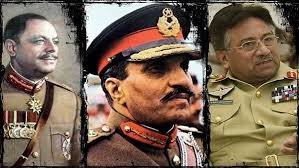Arshad Mahmood Awan
The study of Pakistan’s history demonstrates that whether a ruler has been civilian or military, his governance has left a legacy with lasting consequences for the state and society. The repeated use of coercion, the weakening of the federal structure, and the widening of social divisions are all outcomes of governance choices. This makes the critical evaluation of each ruler’s legacy not just an academic exercise, but a vital lesson for future leaders of Pakistan.
Follow Republic Policy Website
The Legacy of Ayub Khan and Yahya Khan The early decades of Pakistan’s military regimes were dominated by Field Marshal Ayub Khan and General Yahya Khan. Their most significant legacy remains the dismemberment of Pakistan in 1971. The separation of East Pakistan was not simply a geographical loss but a profound national tragedy that shattered the federal structure. This experience illustrated that when a federation is governed through force, authoritarian decrees, and suppression of democratic aspirations, the inevitable outcome is alienation and disintegration. Their legacy cemented an enduring truth in Pakistan’s history: the federation can only remain intact through democratic norms, transparency, and genuine representation of all units of the state.
Follow Republic Policy YouTube
The Legacy of General Zia-ul-Haq The legacy of General Zia-ul-Haq is synonymous with the rise of extremism and radicalization in Pakistan. Before his regime, Pakistani society, while conservative, retained space for liberal, progressive, and pluralist trends. Zia fundamentally altered this trajectory by using religion as a political tool. His Islamization drive institutionalized measures such as the Hudood Ordinances, Shariat courts, and a state-administered Zakat and Ushr system. Though presented as reforms, these initiatives reshaped society along divisive and sectarian lines.
The Afghan jihad, championed as a religious duty, brought immense foreign aid and military support from the United States. Yet the long-term consequences proved devastating. The jihad culture normalized violence, weaponized society, and entrenched a militant ideology. Sectarianism flourished, the Kalashnikov became a symbol of power, and madrassas were transformed into recruitment centers for jihad. The roots of terrorism and extremism that haunt Pakistan today lie in this period. Zia’s legacy highlights the danger of politicizing religion: it undermined moderation, eroded democratic values, and hollowed out the state’s institutions.
Follow Republic Policy Twitter
The Legacy of General Pervez Musharraf General Pervez Musharraf’s legacy is equally contentious. His regime began with slogans of “enlightened moderation” and a promise of reform. Yet, in practice, his rule deepened political engineering, curtailed constitutional supremacy, and fueled insurgency in Balochistan. His reliance on military force alienated Baloch citizens, escalating grievances into outright rebellion. The violent death of Nawab Akbar Bugti became a symbol of Baloch resistance, cementing mistrust of the federation.
Though the 18th Amendment eventually attempted to redress provincial rights, Musharraf’s actions had already deepened fissures. Even today, Balochistan remains a zone of fragility, where non-Baloch citizens feel unsafe and the legitimacy of the federation is routinely questioned. Musharraf’s legacy demonstrates that military force and centralized control cannot sustain a federation; they weaken it from within.
Follow Republic Policy Facebook
The Failures of Civilian Rulers The legacies of Pakistan’s civilian rulers also warrant critical reflection. Unfortunately, the country’s political history is replete with examples of civilian leaders who failed to complete their terms, strengthen democratic institutions, or prioritize institutional reform over personal gain. In provinces such as Balochistan, no elected chief minister has been able to serve a full tenure, underscoring the fragility of representative governance.
Civilian governments, instead of consolidating democratic systems, engaged in power struggles, patronage networks, and short-term political maneuvering. Their legacies, therefore, remain marked not by institutional stability or national integration, but by repeated failures to inspire trust among citizens. This chronic inability has contributed to cycles of instability where both the state and society bear the costs of weak democratic culture.
The Lessons of Legacy The collective history of Pakistan’s rulers illustrates an undeniable lesson: governance leaves indelible marks on the state and its people. Ayub Khan and Yahya Khan relied on authoritarianism, leading to the dismemberment of the federation. Zia-ul-Haq’s Islamization entrenched extremism and sectarianism, creating crises that endure. Musharraf’s reliance on force deepened alienation in Balochistan, while civilian rulers repeatedly failed to deliver on promises of institutional reform and representation.
The lesson for Pakistan’s future leadership is clear. Power and temporary popularity do not define a legacy. A true legacy is built on constitutionalism, federal balance, institutional integrity, and democratic accountability. Without these, rulers will continue to leave behind fractured societies, weakened institutions, and distrustful citizens.
Follow Republic Policy Instagram
Toward a Democratic and Inclusive Future Pakistan today stands at a crossroads. The pressing need is for rulers—civilian or otherwise—to take legacy seriously as a national responsibility. Legitimacy cannot be constructed through military might or symbolic rhetoric. It requires a genuine democratic structure that respects diversity, safeguards rights, and builds institutions capable of serving people impartially. Only then can Pakistan move beyond the destructive cycles of its past legacies.
The path forward lies in embracing lessons from history. If rulers continue to repeat mistakes—centralization of power, politicization of religion, suppression of dissent, and neglect of federal balance—the crisis of legacy will persist. But if Pakistan embraces transparency, consultation, and justice, it can finally turn its legacy into one of resilience, inclusion, and democratic progress.
















